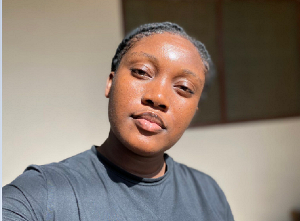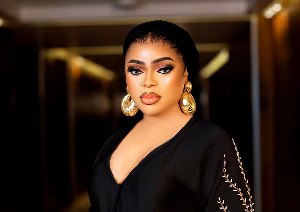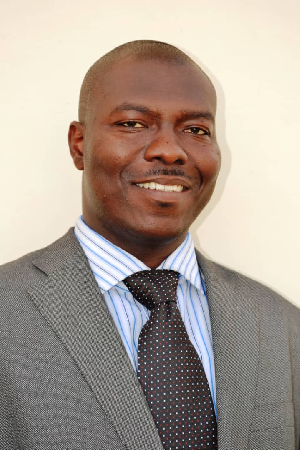- Home - News
- TWI News | TV
- Polls
- Year In Review
- News Archive
- Crime & Punishment
- Politics
- Regional
- Editorial
- Health
- Ghanaians Abroad
- Tabloid
- Africa
- Religion
- Election 2020
- Coronavirus
- News Videos | TV
- Photo Archives
- News Headlines
- Press Release
General News of Sunday, 5 November 2006
Source: Bright Boateng
Interview with Ghana's Foreign Minister
Nana Akuffo Addo, on the heels attending the Non-Aligned Movement conference held in Havana Cuba also traveled to Washington, DC. to attend the North American Congress for the National Patriotic Party (NPP), the ruling political party. He also visited Atlanta, GA., at the invitation of the Ghana Political Action Group, a new political watchdog for Ghanaians in the city. The former Attorney General recently chaired the United Nations Security Council meeting at the height of the 34-day Israeli-Hezbollah conflict.
You just recently attended the Non-Aligned Movement (NAM) conference held in Havana, Cuba. The NAM is a Cold War era movement. Is the movement still relevant?
We think so. Of course first of all we are attached to the movement for historical reasons. Our first leader, Kwame Nkrumah was one of the five world leaders who met in Belgrade in 1961 to found the movement so there is a Ghanaian involvement in the movement, which is peculiar and heartening.In the height of the Cold War, the countries of the South (or developing countries) needed a voice to vent their political concerns. The transformation of the NAM into that vehicle is something that we think is positive and valuable. It’s a forum, which allows the weak nations of the world, the poor nations of the world to be able to sit and talk about common problems and if possible, in many occasions find solutions and positions on these common problems. That has to be a good thing for the world.
The Cold War was mainly a conflict between the East and the West, and Ghana, under Kwame Nkrumah made it a policy not to take sides. Now there are issues such as Israeli-Palestinian conflict, what is Ghana’s position on that issue?
As far as the Middle Eastern conflict between the Palestinians and the Israelis, our country has been consistent for a long time. We (the Ghana government) have supported the two-state solution to the resolution of the Palestinian problem consistently. We believe that ultimately the solution for the area will be to have a situation whereby an independent, viable democratic Palestinian state lives side by side with an Israeli state, within internationally accepted and secure boundaries. And that continues to be the thrust of our policy. We try as much as possible to be even-handed.
We were Israel’s first diplomatic outreach in Africa immediately after our independence. They did a lot of very good work that was done in the early days of Kwame Nkrumah’s time. The Israeli government was a very important partner. The Israelis were very instrumental in trying to get our agriculture going as well as the Black Star Line and several other areas. So in other words, we have very good relations with Israel. We continue to cherish our relationship with them. But at the same time, we recognize that injustices have been done to the Palestinian people and to that extent we sympathize and are in solidarity with them. And believe that to the extent that efforts are being made to make sure they have a homeland of their own that is incumbent to peace and security we support that initiative as well.
There has been much uproar about some $20 million that the government of Ghana has allocated for the country’s 50th anniversary celebrations, next year. Can you break down what the money would be used for?
Part of it will be for building some infrastructure and housing for the various dignitaries that we are expecting in the country. I suspect that money will not be enough for the goals we have at the moment. I believe that hopefully, we will get the Ghanaian private sector also to support the exercise. That therefore is the thrust of what we are trying to do.You talked about the venerable image of Ghana, at the same time recent developments have shown Ghana as cultivating an image as a drug transit point, as well as a hub for sex tourism. How is the government responding to address these issues?
Whenever you talk about a country, it’s like a person, their assets and liabilities. Anyone of us either as an individual or as a nation is going to have both sides of the ledger sheet, the assets and liabilities. There are developments that are not particularly positive some of those that you have mentioned we need to try and address them.But at the same time they do not define the full image of Ghana because there is the Ghana, too, which is rapidly becoming a model of democratic development in Africa, a country where there is eternal peace of the region, where institutions of a democratic state are increasingly being strengthened and enhanced and a nation that is also making very serious efforts to come to grips with development issues with regards to the national economy. So I think that on balance, the image of our country is positive, that is not to say that there are no problems. There are clearly problems, but even in the US, there are problems, but you are right. There is other disturbing developing phenomenon, and all of us need to pay very close attention to see what we need to do to arrest them.
This involvement of our country as a potential transit, trans-shipment point for drugs is something that is very serious. The government takes it a very serious view of it and we are trying to develop a strategy to combat it. It’s not easy, for poor countries like we are to deal with this menace, but we need to do it. One of the things that the president did recently was to establish the Georgina Wood Committee to investigate this particular development of the drug industry in Ghana, but there are possible wider strategies to combat them. The sex tourism issue is also an unwelcome development in our country tied of course to the issues of income and poverty, etc.
Majority of the so-called Asian Tigers were not necessarily democratic, and yet they were able to achieve impressive levels of economic growth. Do you see a contradiction, and is it feasible for similar developments to be attained in the current democratic atmosphere in the country?
Yes, of course it is, but I think first of all, it’s also important to recognize that every nation has its own particular path to development. That may have been the path in Asia. But I believe that it’s equally possible in West Africa to develop as rapidly as they did, but under the aegis of democratic institutions. I don’t believe that we need authoritarian rule to be able to develop. Look at India--the developments taking place there are phenomenal. It’s very much equal to what is going on in China and it is being done under a democratic environment.That is the model that we can follow to our benefit. We don’t see a contradiction. I think it’s possible. And in fact we can succeed like India has done and in some ways it’s an even better path of industrialization that these things are done by free people and not by people being herded and being told what to do by the rulers of the day. It’s important that it be dominated and promoted by free societies of free individuals. Perhaps it’s an even higher form of development than you see in other parts of Asia.
As India and China are making inroads into Africa, what are we learning from them, and what foundations are being laid to ensure a prudent and rapid economic development?
I think there are key ones, apart from the social infrastructure in education and health. The key thing is about how to empower Ghanaian business class and stimulate the entrepreneurial spirit amongst our people. That is the phase of development we now have to address, which can help us to accelerate the development of our country.
What are the main pillars for the country to achieve rapid economic development of the country?
We are talking more or less of the Asian model—the agro-led industrial development where we need to enhance dramatically, agricultural productivity and create subsistence level to allow industrialization to begin in Ghana. We are doing so also within the context of the ECOWAS idea, where we are looking at markets much bigger than our own in Ghana to make it possible for that to take place.You mentioned that one of the projects that the NPP government is undertaking is setting up model secondary schools as there were in the 1960s. Many of the infrastructures for many of the nation’s universities, for example, are in equally deplorable state. What is being done to at least revitalize the overall educational infrastructure?
We are talking about the model secondary schools now, not in the 60s. These are our ideas, the Kufour government, which are being resourced. For example, Abuakwa State Secondary School (Abusco) is one of those schools that are in my district. Now, all those decisions have been made and investments are going to them to give them that special status.Governments since Nkrumah have neglected them totally and there have not been any investments in tertiary education in our country for some twenty or thirty years. So, surprisingly when you go to some of the Universities you see these appalling conditions of infrastructure.
Our government (the Kufour government) is the first that has made any serious attempt to put fresh capital into the universities to expand accommodation, as well as the teaching hospital. In any case we are just four years old and these things are not done overnight. So the images, in three or four years when you go there (to the) you will see a new image as a result of the expansion and the sort of things that we are engaged in.
But the appalling state of our educational system, the appalling state of tertiary institutions, these are real legacy of these so-called revolutionary regimes that neglected to look at the fundamental and positive things that needed to be done. They spent all their time chasing their tales, searching for non-existent coup d’etat, instead of looking at what needed to be done for the country.
We are all paying for it now. The things that should have been corrected ten, fifteen, or twenty years ago were left to neglect, and today we are having to pick up the pieces. But we are making determined efforts to do so.
Many Ghanaians in the diaspora have made attempts to go back home to resettle only to return out of frustration, either over infrastructural shortcomings or bureaucratic bottlenecks. Are people who complain just being impatient or is something inherently wrong with the system in general?
I don’t think there is anything inherently wrong with the system. I think that it is easier for people to seek development to succeed in Ghana. I think it is healthy for people to want to do something for Ghana because there are many diasporan communities that have cut themselves off from their homelands. I am very excited, and whenever I come heare (overseas) and I see how attached to the homeland, the Ghanaian diaspora is, whether it’s in America or in Europe, wherever you look, people are genuinely concerned about issues at home. And the potential that it represents in terms of skills, capital and of talent is something that we need to tap and link to our development at home. Those are matters that we have to address absolutely.This whole coming back home is a very recent phenomenon. For a long time people were fleeing. They were not saying they were coming home at all. But now because there is a perception that serious and solid foundations are being made in the country that is what is attracting the interest to go back. Hence we also need to work out what we need to do to make that transition easier and less fractious. That is an important concern of our government.










